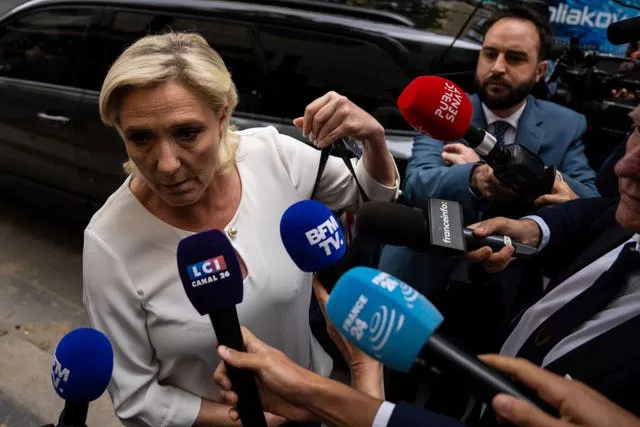France’s National Rally surged into the lead in the first round of legislative elections, according to results released early Monday, taking the far-right party to the brink of power and dealing a major blow to President Emmanuel Macron’s centrists in an election that could set the country, and Europe, on a starkly different course.
The results confirmed polling that showed the party, with a history of racism and xenophobia and once shunned by the mainstream, is no longer taboo, confined to the fringes of French politics.
There remains another torrid week of campaigning before the decisive final voting on Sunday, and whether the National Rally will be able to win an outright majority and form France’s first far-right government since the Second World War remains uncertain.
Marked by high turnout of nearly 68% that reflected the high stakes, voters handed the Marine Le Pen’s National Rally a strong lead, with about 33% of the vote.

The number includes the votes from a group of conservative candidates of The Republicans party who had allied with the far-right party in the first round.
The New Popular Front, a leftist alliance, finished second with about 28%. The president’s centrist group came third with about 20%, according to figures released by the interior ministry.
When Mr Macron dissolved the National Assembly on June 9, after a stinging defeat at the hands of the National Rally in French voting for the European Parliament, the deeply unpopular and weakened president gambled that his rivals would not repeat that success when the country’s own fate was in the balance.
He and his allies, as well as politicians on the left, are still hoping they can head off an outright win by the National Rally, and horse-trading began on Monday, with some efforts to block far-right candidates taking shape.
The leftist coalition said it would withdraw its candidates in districts where they came third in order to support other politicians opposed to the far right.
Mr Macron’s centrist alliance also said some of its candidates would step down before the runoff.
In Sunday’s voting, 78 of the National Assembly’s 577 seats were won outright, by candidates who got more than 50% of the vote in their district, according to French newspaper Liberation’s analysis of the interior ministry data.

Of those, 38 were from the National Rally, including Ms Le Pen herself.
That triumph provided an additional boost for the far-right parties in Europe as Viktor Orban’s Hungary takes over the European Union’s rotating presidency for six months.
To underline her party’s triumph, Le Pen said that National Rally lawmakers would meet at the parliament on Monday and symbolically claim their seats.
Addressing a jubilant crowd waving French tricolour flags of blue, white and red, Ms Le Pen called on her supporters and voters who did not back her party in the first round to push it over the line and give it a commanding legislative majority.
That scenario would make the party’s young leader, Jordan Bardella, prime minister, and force him and Mr Macron into an awkward powersharing arrangement.
Mr Macron, first elected in 2017, has said he will not step down before his second term expires in 2027.
Je remercie les électeurs de ma circonscription qui me renouvellent leur confiance en me réélisant dès le premier tour avec 58% des voix.
L’objectif désormais : obtenir dimanche prochain une majorité absolue à l’Assemblée nationale.
Merci à tous ! pic.twitter.com/w3qNdcUrLZ— Marine Le Pen (@MLP_officiel) June 30, 2024
“The French have almost wiped out the Macronist bloc,” Ms Le Pen said on Sunday. The results, she added, showed voters’ “willingness to turn the page after seven years of contemptuous and corrosive power”.
If the National Rally is able to form a government, it has promised to dismantle many of Mr Macron’s key domestic and foreign policies, including taking a more confrontational approach to the European Union and stopping French deliveries of long-range missiles to Ukraine.
The National Rally has historical ties to Russia, which invaded its neighbour two years ago.
At home, the party’s plans include the rollback of Mr Macron’s pension reform that raised the retirement age and promises to boost voters’ spending power, without clearly detailing how it would pay for the pledge that could also spook European financial markets.
National Rally opponents fear for civil liberties if it takes power.
Mr Macron himself warned that the far right could set France on a path to civil war.
Its plans to boost police powers and curb immigration also alarm many, including minorities. The National Rally has long been hostile toward France’s Muslim community.







